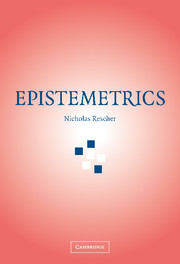Book contents
- Frontmatter
- Contents
- Preface
- 1 Asking for More Than Truth: Duhem's Law of Cognitive Complementarity
- 2 Kant's Conception of Knowledge as Systematized Information
- 3 Spencer's Law of Cognitive Development
- 4 Gibbon's Law of Logarithmic Returns
- 5 Adams's Thesis on Exponential Growth
- 6 Quality Retardation
- 7 How Much Can Be Known? A Leibnizian Perspective on the Quantitative Discrepancy Between Linguistic Truth and Objective Fact
- 8 On the Limits of Knowledge: A Kantian Perspective on Cognitive Finitude
- Conclusion
- Bibliography
- Index of Names
1 - Asking for More Than Truth: Duhem's Law of Cognitive Complementarity
Published online by Cambridge University Press: 06 August 2009
- Frontmatter
- Contents
- Preface
- 1 Asking for More Than Truth: Duhem's Law of Cognitive Complementarity
- 2 Kant's Conception of Knowledge as Systematized Information
- 3 Spencer's Law of Cognitive Development
- 4 Gibbon's Law of Logarithmic Returns
- 5 Adams's Thesis on Exponential Growth
- 6 Quality Retardation
- 7 How Much Can Be Known? A Leibnizian Perspective on the Quantitative Discrepancy Between Linguistic Truth and Objective Fact
- 8 On the Limits of Knowledge: A Kantian Perspective on Cognitive Finitude
- Conclusion
- Bibliography
- Index of Names
Summary
(1) Duhem's Law of cognitive complementarity holds that inquiry is subject to a complementary relationship between security and confidence on the one hand, and definiteness and detail on the other, so that s × d ≤ const. (2) Among other things, this relationship serves to characterize the difference between science and common sense, seeing that these two domains take a very different stance regarding security and definiteness. (3) Duhem's Law engenders an impetus to vagueness in matters where truth is paramount. (4) Moreover, security/detail complementarity has important lessons for the conduct of inquiry, and in particular means that knowledge is more than correct information as such.
The Security/Definiteness Trade-off and the Contrast Between Science and Common Sense
It is a basic principle of epistemology that increased confidence in the correctness of our estimates can always be secured at the price of decreased accuracy. For in general an inverse relationship obtains between the definiteness or precision of our information and its substantiation: detail and security stand in a competing relationship. We estimate the height of the tree at around 25 feet. We are quite sure that the tree is 25 ± 5 feet high. We are virtually certain that its height is 25 ± 10 feet. But we can be completely and absolutely sure that its height is between 1 inch and 100 yards.
- Type
- Chapter
- Information
- Epistemetrics , pp. 1 - 8Publisher: Cambridge University PressPrint publication year: 2006
- 1
- Cited by



